Our Publications
Our Publications
Our faculty, staff, and partners create and share knowledge that benefits public organizations and communities, and advances the field of public leadership and governance.
Search a selected list of publications or browse by topic area:
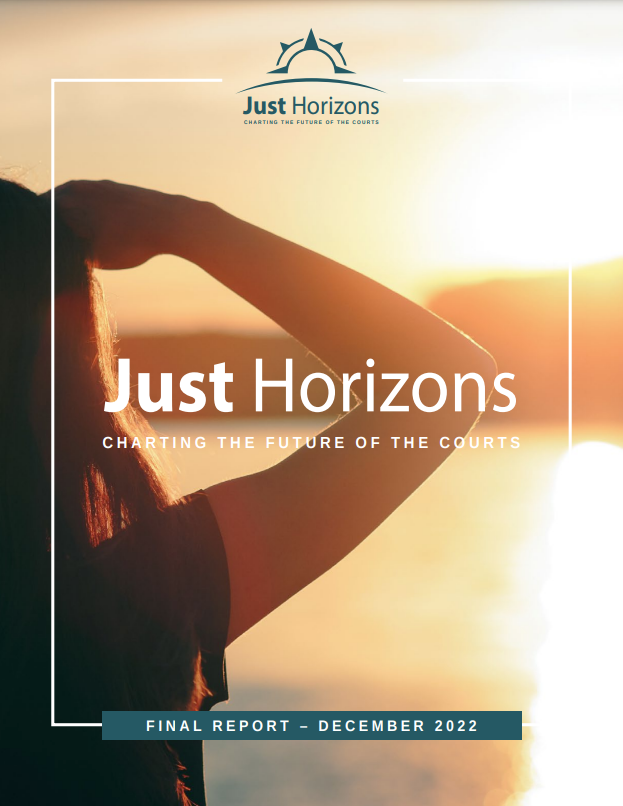
Just Horizons
12/31/22In August 2020, the National Center for State Courts launched the Just
Horizons initiative to explore the changing needs of the judicial system and
those who use it. The initiative was conceived in 2019 in preparation for
the Center’s celebration of its 50th anniversary in 2021. At that time, we had
no idea that the initiative would be launched amid a global pandemic and
intense social and political unrest at home and abroad. These events only
crystallized the importance of our effort to better anticipate and understand
emerging social, technological, and environmental trends that also could
disrupt the meaningful delivery of justice by our nation’s courts.
…
Continued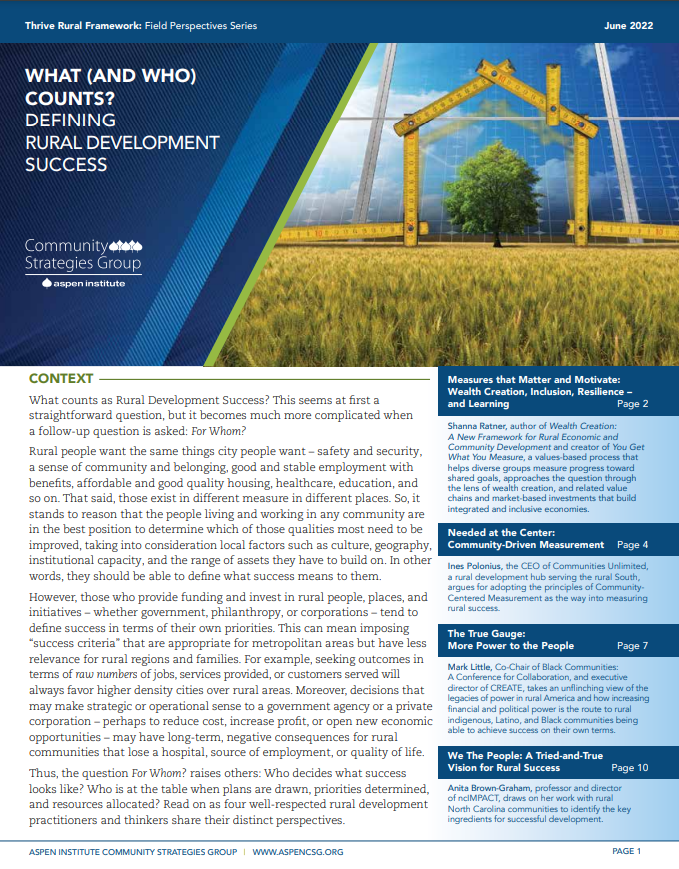
What (and Who) Counts? Defining Rural Development Success
06/06/22There are no easy solutions for the many challenges that rural American faces, but what is clear is that rural communities themselves must drive change and transformation. Aspen Community Strategies Group’s new report, What (and Who) Counts? Defining Rural Success features Anita Brown-Graham and three other well-respected rural development practitioners’ perspectives on how we can better define rural development success.
…
Continued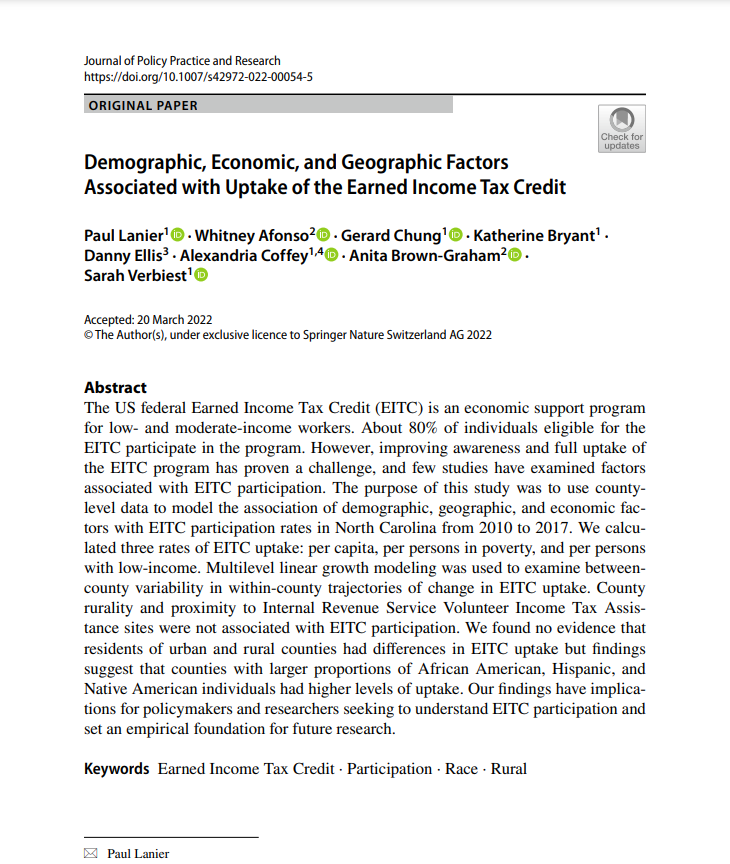
Demographic, Economic, and Geographic Factors Associated with Uptake of the Earned Income Tax Credit
04/06/22The US federal Earned Income Tax Credit (EITC) is an economic support program for low- and moderate-income workers. About 80% of individuals eligible for the EITC participate in the program. However, improving awareness and full uptake of the EITC program has proven a challenge, and few studies have examined factors associated with EITC participation. The purpose of this study was to use county level data to model the association of demographic, geographic, and economic factors with EITC participation rates in North Carolina from 2010 to 2017.
…
Continued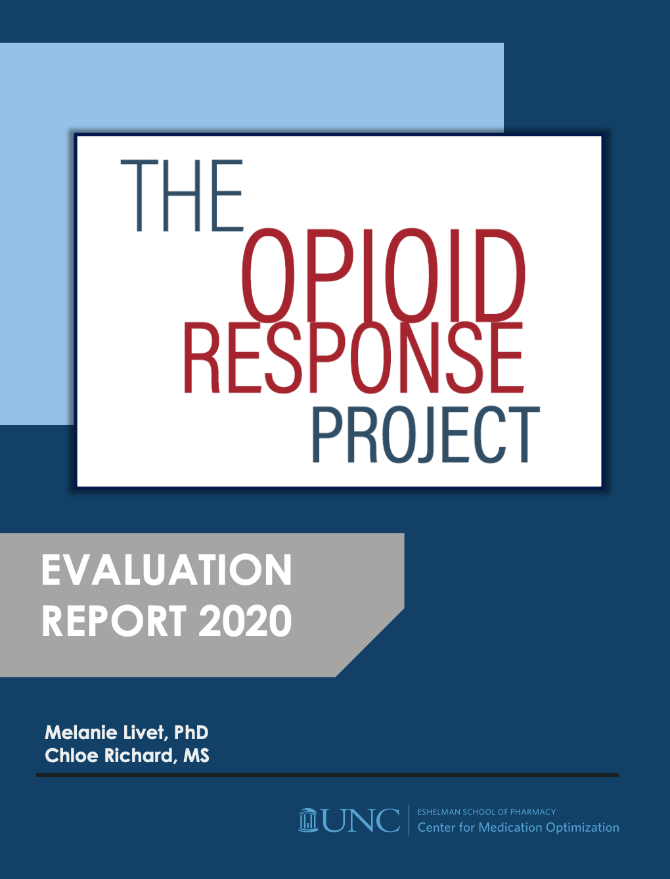
The Opioid Response Project: Evaluation Report 2020
05/31/21“The communities chose to focus on goals surrounding increasing access to and engagement with treatment; decreasing access to opioids and preventing new substance use disorder (SUD) cases; reducing stigma and increasing awareness and knowledge of addiction, opioid use and misuse, impacts of opioid use on the community, and prevention and treatment options; improving health, safety, and recovery in their communities; increasing community collaboration and capacity; and increasing access to funding.”
…
Continued
Community Development Organizations’ Capacity to Respond to COVID-19: The Strategic Use of Social Capital
05/01/21It has long been noted that community development organizations use social capital to build capacity for the constituencies they serve. Less recognized, however, is the ability of these organizations to leverage social capital to improve their own capacities. Our research shows that CDOs that use social capital in this way are more likely to be resilient. How do they do it? The leaders we spoke with identified strategies related to expanding their networks, clearly articulating/reciprocating benefits, and pinpointing opportunities to improve competencies.
…
Continued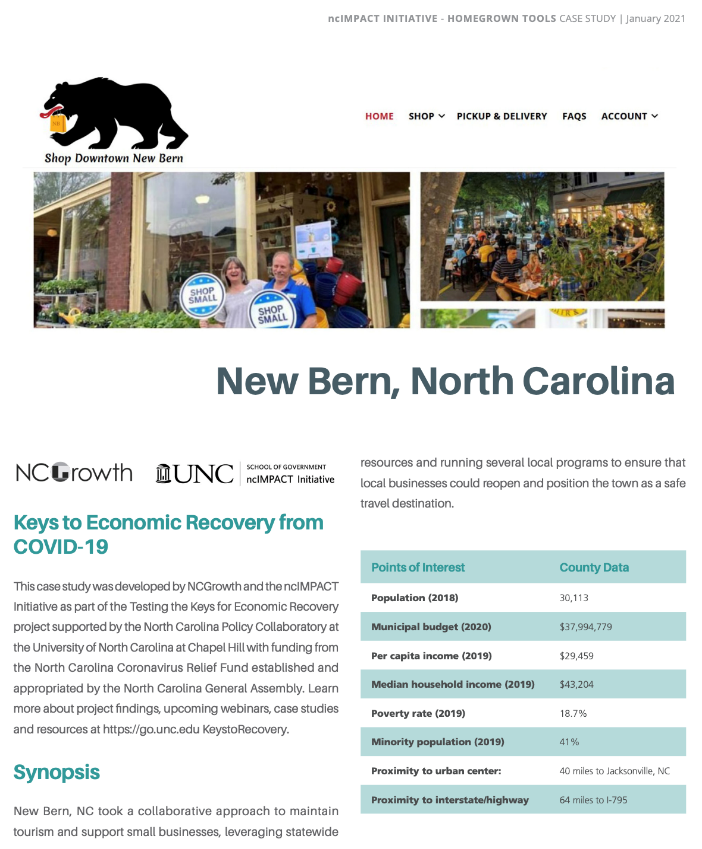
Homegrown Tools Case Study: New Bern, NC
01/31/21“Count on Me NC was promoted to all the destination marketing organizations across North Carolina. Visit New Bern, New Bern’s tourism development authority, was an early adopter and went further to partner with Visit NC through their cooperative marketing program to promote the town as a safe travel destination. Visit New Bern encouraged local restaurants, hotels, and other businesses to get the Count On Me NC certification so that they could position the town as a safe travel destination.”
…
Continued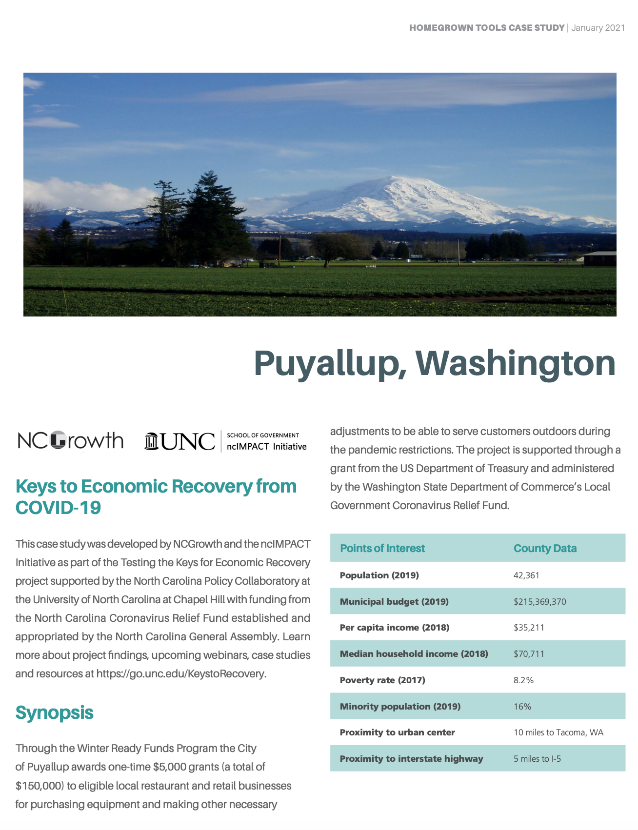
Homegrown Tools Case Study: Puyallup, WA
01/31/21“The City of Puyallup is a commuter city in the Puget Sound region of Washington. Puyallup’s economy relies heavily on the retail, restaurant, and visitor services industry of its commercial district, anchored by South Hill Mall, and its historic downtown. The unique nature of the COVID-19 pandemic and the indoor capacity restrictions negatively impacted local businesses. To allow for retail and restaurant businesses to operate according to public health guidelines, the City created a grant to support businesses’ efforts to prepare for the colder winter temperatures and continue to provide services outdoors.”
…
Continued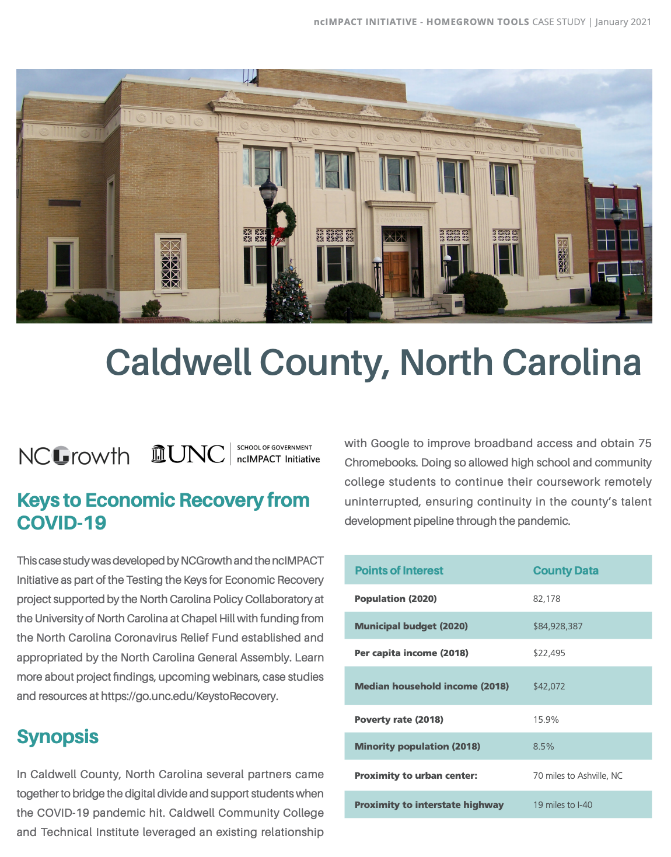
Homegrown Tools Case Study: Caldwell County, NC
01/31/21“CCC&TI first consulted with the county health department and other healtcare entities to understand the scope of the problem. CCC&TI also surveyed students and conducted outreach through social media to understand their needs. They found 111 students in curriculum courses without internet access, 78 without devices, and 40 lacked both. Based on this information, leadership reached out to Google to explore techincal solutions. The college has a longstanding relationship with Google and their history of collaboration and trust made it easy to work together to address this emergency need.”
…
Continued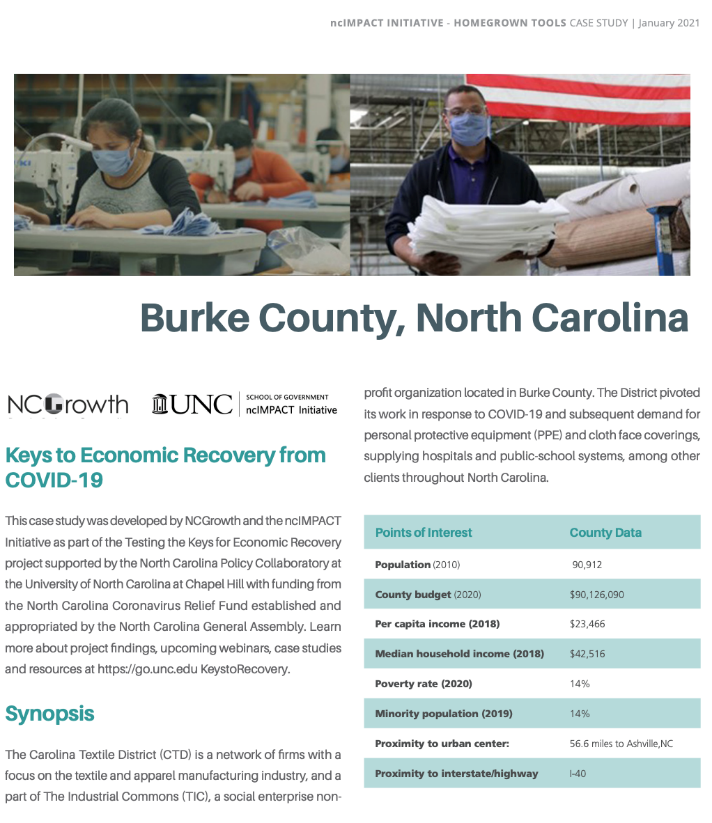
Homegrown Tools Case Study: Burke County, NC
01/31/21“During the COVID-19 pandemic when demand for regular products slowed down, this network and support structure enabled CTD to quickly meet the increased need for personal protective equipment (PPE) and cloth face coverings. Their overall structure did not change, but rather shifted to meeting specific needs by adding new partners and contracting with new clients.”
…
Continued
Homegrown Tools Case Study: Belmont, NC
01/31/21“The “Keep the Lights on in Belmont” campaign was created and is still run by the Downtown Belmont Development Association. Originally, the strategy started to address concerns about Main Street businesses’ inability to continue operating. As it is the center of town, it was important to put focus on ensuring its health.”
…
Continued
Homegrown Tools Case Study: Fayetteville, NC
01/31/21“After businesses began to temporarily close and unemployment increased, it became clear that the pandemic would have an immediate impact on the local economy in Fayetteville. The City’s Economic and Community Development Department began to work with the Chamber of Commerce and the Center for Economic Empowerment and Development (CEED), a local nonprofit, to find a solution. This partnership network paved the way for providing bridge funding for businesses.”
…
Continued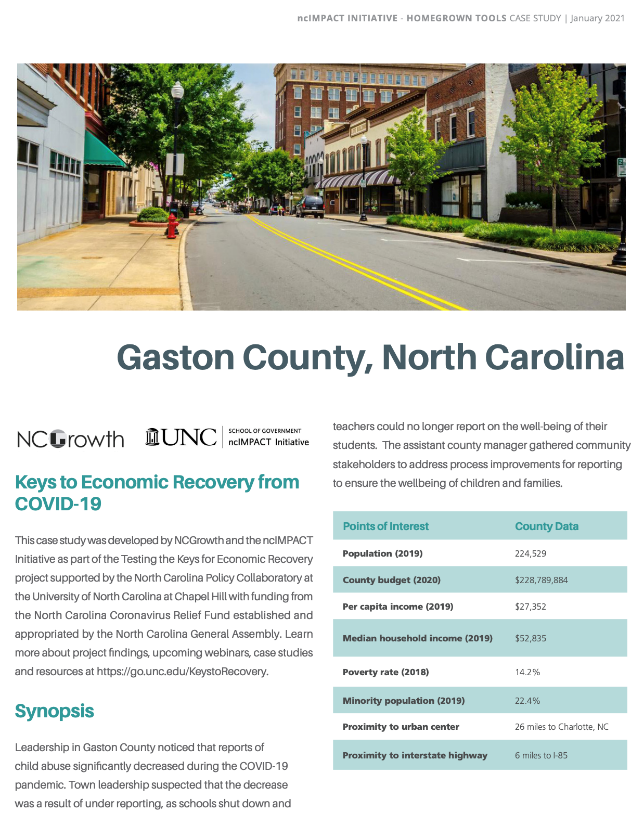
Homegrown Tools Case Study: Gaston County, NC
01/31/21“The BrightHive partnership was established before the pandemic, as Gaston County had already been working on process improvements for child welfare reporting. Given the unique impact of the pandemic on this issue, the County was able to use CARES Act funds to elevate the work and contract BrightHive to create a data trust. A data trust is a system that brings together data from many different sources, synthesizing it onto one platform. BrightHive is creating a data trust to identify new, and more resilient sources of data and data-sharing networks to provide the information human services staff need to keep children safe from abuse and/or neglect.”
…
Continued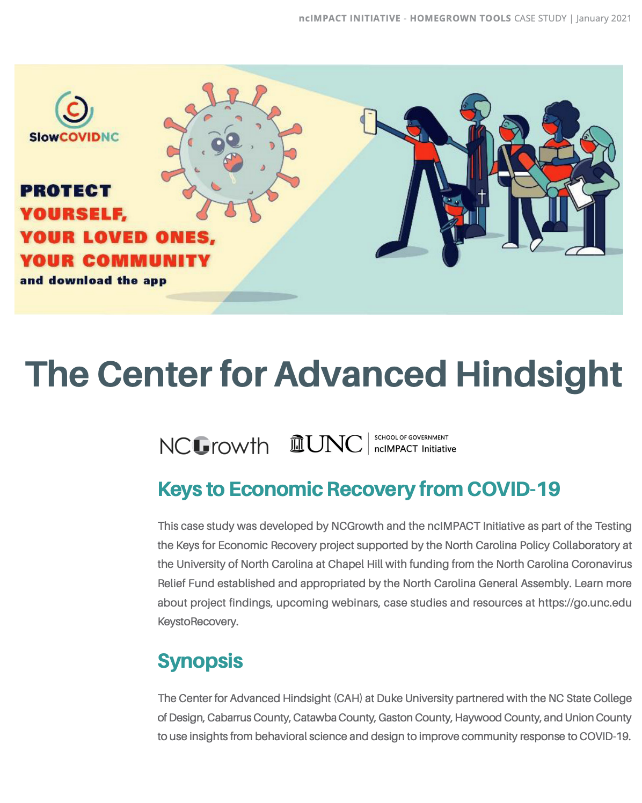
Homegrown Tools Case Study: The Center for Advanced Hindsight
01/31/21“The Center for Advanced Hindsight at Duke University seeks to use behavioral science to make people happier, healthier, and wealthier through research and human-centered design. With this project, CAH sought to provide behavioral science tools to county governments that would lead to long term behavior change, allowing for safe re-opening and realization of economic opportunities that have been delayed due to COVID-19. Recognizing that a majority of the federal relief funding was targeted to cities, CAH designed the project for counties to test solutions, promote collaboration, and learn from each other.”
…
Continued
NC Local Government Responses to the Coronavirus Pandemic
10/01/20This report offers insights from the results of two surveys of North Carolina’s elected and appointed local government leaders in response to COVID-19. While the spring survey came at a time when unemployment claims surged ahead of positive COVID-19 cases, by the fall, despite positive cases soaring to new records, the economy appeared to have settled significantly due to news about near-term vaccines. Our analysis points out notable contextual changes between the spring and fall. However, much remained the same in the world of North Carolina local governments.
…
Continued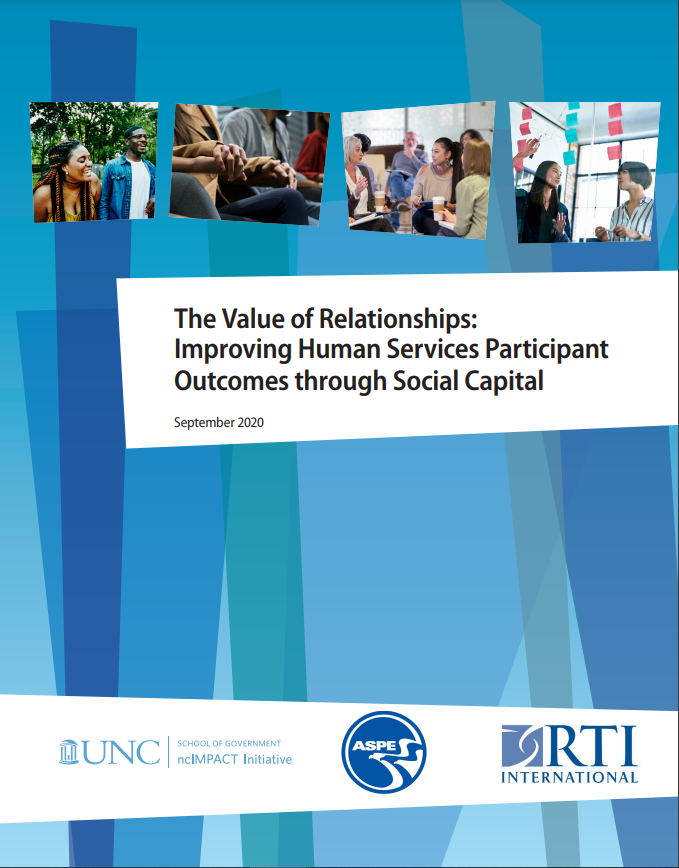
The Value of Relationships: Improving Human Services Participant Outcomes through Social Capital
09/01/20Social capital focuses on the personal relationships and networks that each of us has and how we use them. For many human service program managers, social capital may be key to reaching program goals. In fact, whatever your role in the organization, your skill at helping participants build and benefit from their own social capital may in some cases be as central to your program’s success as securing funding.
…
Continued
NC Local Government Early Responses to and Insights into the Coronavirus Pandemic
08/01/20“Overwhelmingly and not surprisingly, given the unprecedented nature of the pandemic, three-fourths of respondents indicated they expected a negative impact on the local government due to COVID-19. Nearly all other respondents indicated that it was simply too soon to tell, with almost no respondents indicating no impact or a positive impact.
Just over ten percent of respondents chose to further explain their concerns. These respondents highlighted cancellations of in-person meetings, including public meetings; loss of funds, both for the government itself and the community; and, the adverse impacts for citizens, including food insecurity and unemployment as high concerns about negative impacts of the pandemic.”
…
Continued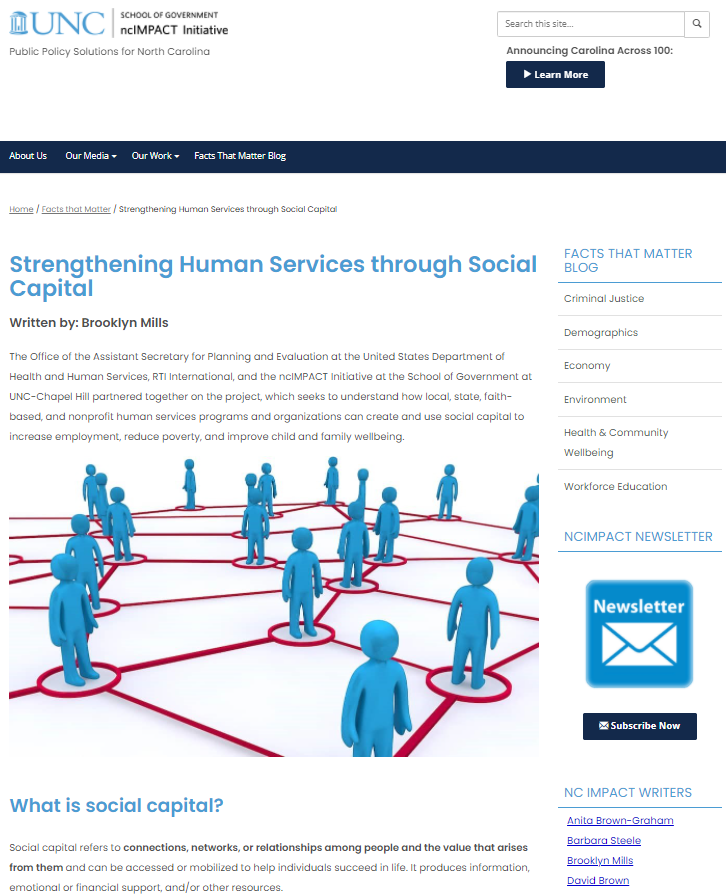
Strengthening Human Services through Social Capital
06/17/20The Office of the Assistant Secretary for Planning and Evaluation at the United States Department of Health and Human Services, RTI International, and the ncIMPACT Initiative at the School of Government at UNC-Chapel Hill partnered together on the project, which seeks to understand how local, state, faith-based, and nonprofit human services programs and organizations can create and use social capital to increase employment, reduce poverty, and improve child and family wellbeing.
…
Continued
Emerging Social Capital Principles and Practices
06/17/20According to our expert advisors, before individual practices are put in place, certain principles – referred to by those involved as ideas, convictions, or values — need to exist in programs first. They should be recognized and used by staff. All aspects of a social capital-based approach rely on these principles.
…
Continued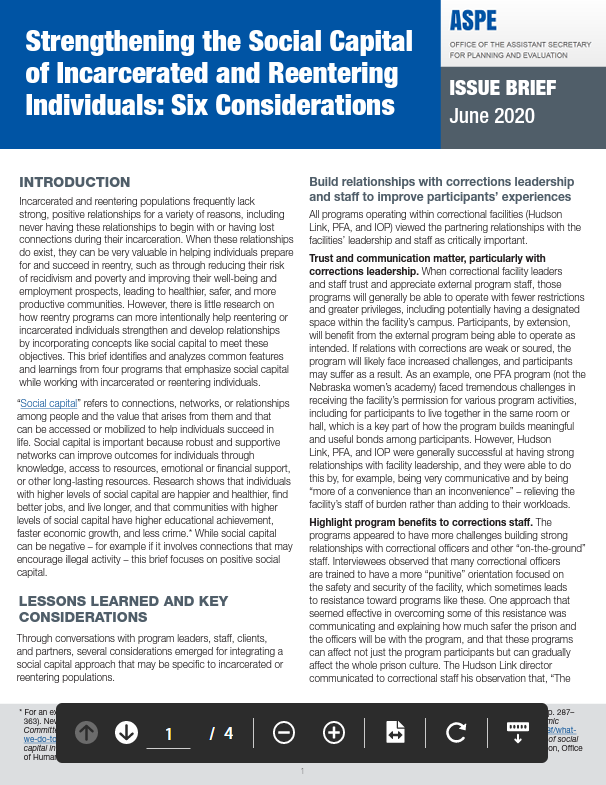
Strengthening the Social Capital of Incarcerated and Reentering Individuals: Six Considerations
06/01/20Incarcerated and reentering populations frequently lack strong, positive relationships for a variety of reasons, including never having these relationships to begin with or having lost connections during their incarceration. When these relationships do exist, they can be very valuable in helping individuals prepare for and succeed in reentry, such as through reducing their risk of recidivism and poverty and improving their well-being and employment prospects, leading to healthier, safer, and more productive communities. However, there is little research on how reentry programs can more intentionally help reentering or incarcerated individuals strengthen and develop relationships by incorporating concepts like social capital to meet these objectives. This brief identifies and analyzes common features and learnings from four programs that emphasize social capital while working with incarcerated or reentering individuals.
…
Continued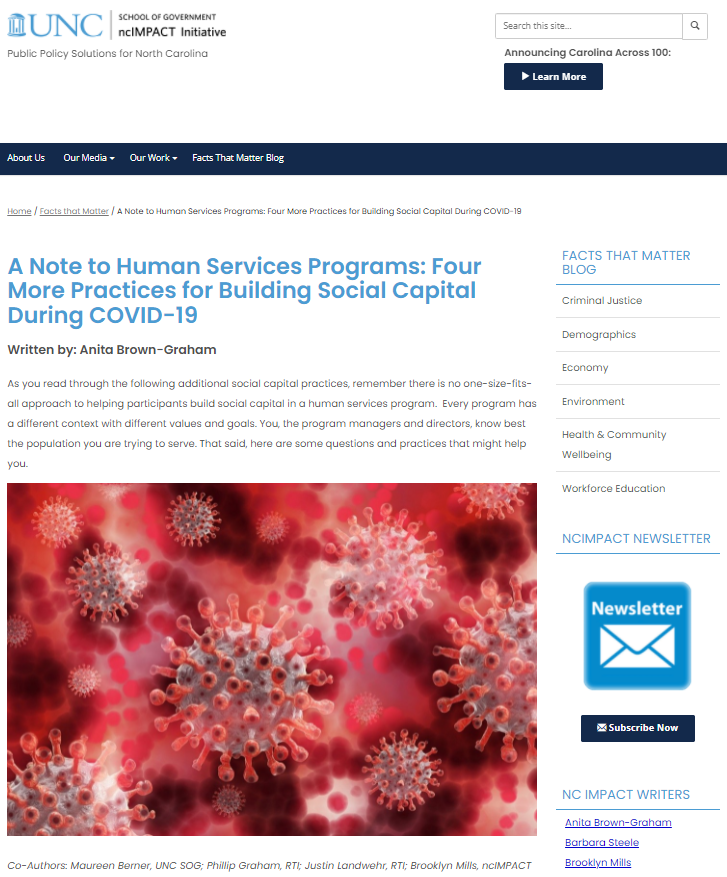
A Note to Human Services Programs: Four More Practices for Building Social Capital During COVID-19
04/01/20As you read through the following additional social capital practices, remember there is no one-size-fits-all approach to helping participants build social capital in a human services program. Every program has a different context with different values and goals. You, the program managers and directors, know best the population you are trying to serve. That said, here are some questions and practices that might help you.
…
Continued
Finding a Better Way: A Case Study on Challenges to Inclusive Economic & Workforce Development
12/01/19“Taken together, these results show that working people are challenged to earn enough to make ends meet. One common way to increase compensation is to increase a worker’s level of education and training, and indeed, among the eight overall categories of needs in our survey, 64 percent of respondents chose “Education and Training” as one of the three most important. It was the most-chosen response, with “Employment Support” the next highest at 46 percent (Figure 3).”
…
Continued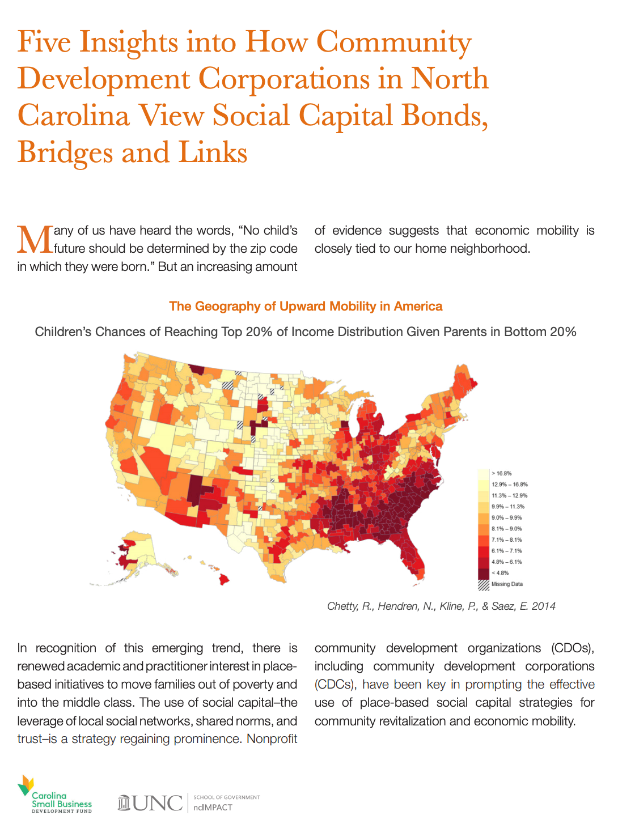
Five Insights into How Community Development Corporations in North Carolina View Social Capital Bonds, Bridges and Links
05/31/19“The use of social capital–the leverage of local social networks, shared norms, and trust–is a strategy regaining prominence. Nonprofit community development organizations (CDOs), including community development corporations (CDCs), have been key in prompting the effective use of place-based social capital strategies for community revitalization and economic mobility”
…
Continued
The Forsyth Story: A Strategy for Creating a More Inclusive Economy
02/01/19“The ncIMPACT team analyzed demographic data, the results of an electronic survey of Forsyth residents and workers, and comments recorded during interviews and focus groups to distill the county’s present challenges to ten overarching themes”
…
Continued
NC PRE-K PROGRAM FACT SHEET
09/01/17“Program effectiveness
• According to a UNC evaluation of the 2015-16 school year, NC Pre-K demonstrated consistent, positive effects on children’s skills at the end of kindergarten in two key domains of learning—math and executive function.
• A UNC summary of annual NC Pre-K evaluations conducted from 2002 to 2016 stated that poor children who attended the program fared better on third-grade reading and math end-of-grade tests than poor children who did not attend.
• A Duke University study published in 2016 found that North Carolina’s investment in pre-K and Smart Start has resulted in higher test scores, less grade retention, and fewer special education placements through fifth grade.
• According to the study, the benefits extended beyond students who attended pre-K—that is, being in class with former NCPre-K students helped non-attendees do better in later grades.”
…
Continued
The Current State of Scientific Knowledge on Pre-Kindergarten Effects
06/01/17“While the depiction of the preschool and public pre-kindergarten landscape requires significant explication, one conclusion is clear: Any summary evaluation of the impact of public pre-kindergarten programs on children’s outcomes must recognize that such programs vary greatly across states and are directed to different kinds of children.”
…
Continued
The Current State of Scientific Knowledge on Pre-Kindergarten Effects
05/16/17In this study, NC Pre-K and Smart Start were evaluated across 13 years, following children through age 11 (end of elementary school) in each of North Carolina’s 100 counties. This study has, to date, involved approximately 1 million children. It took advantage of the fact that state funding levels varied across counties and across years. The researchers asked the policymakers’ question: Does the level of state funding allocated for each of these programs to a particular county in a particular year influence the educational outcomes for the children living in those counties and years?
…
Continued
Trial Judges’ Perceptions of North Carolina’s Office of Indigent Defense Services: A Report on Survey Results
03/01/16“Two of the most striking survey results were (1) the 80 of 119 judges who observed an impact on the quality of representation provided by assigned counsel that they attribute to the 2011 reduction in rates paid to such counsel and (2) the 59 of 66 judges who indicated in a follow-up question that the quality of indigent representation had suffered as a result. In their comments, judges raised concerns about experience, availability, and preparation. In other words, they associated the rate reductions with several of the key concerns they had described in response to earlier questions about their satisfaction with IDS administration of indigent defense. This further indicates that decisions related to PAC compensation rates can affect the overall quality of indigent representation.”
…
Continued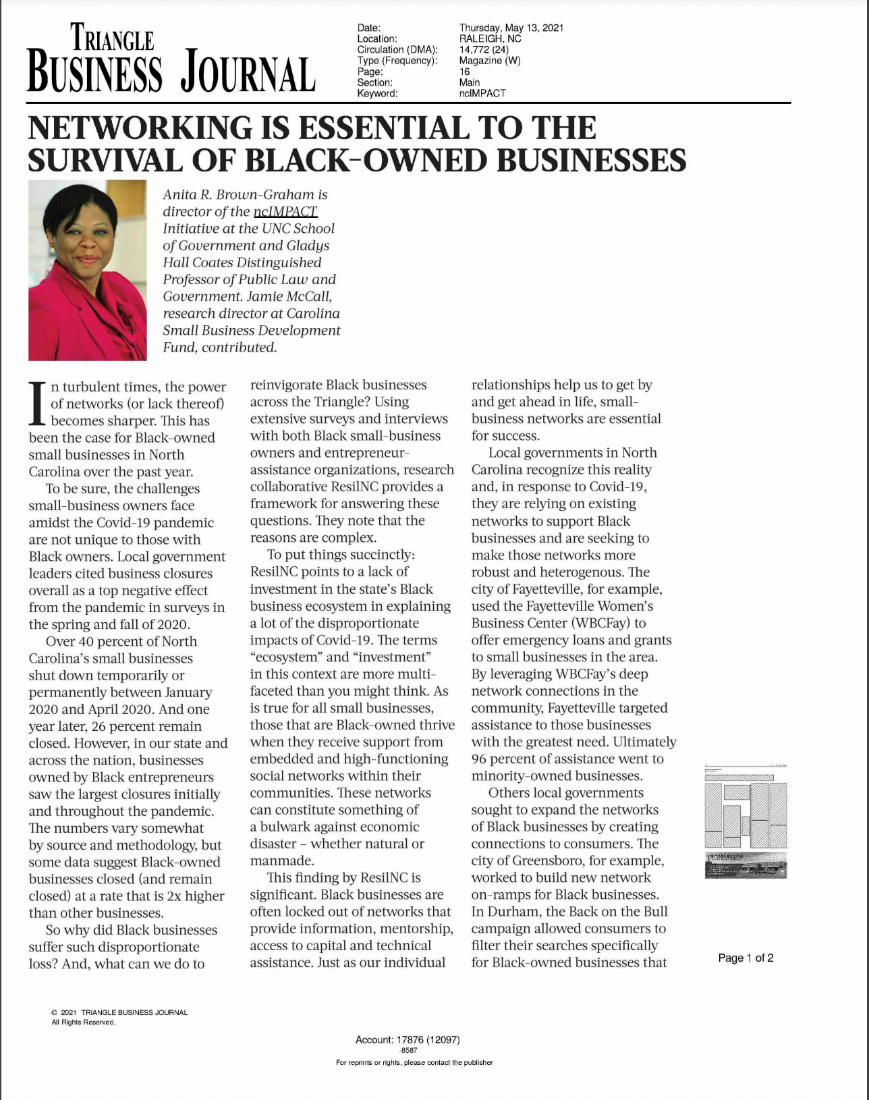
Networking is Essential to the Survival of Black-Owned Businesses
05/13/21“So why did Black businesses suffer such disproportionate loss? And, what can we do to reinvigorate Black businesses across the Triangle? Using extensive surveys and interviews with both Black small-business owners and entrepreneur-assistance organizations, research collaborative ResilNC provides a framework for answering these questions. They note that the reasons are complex.”
…
Continued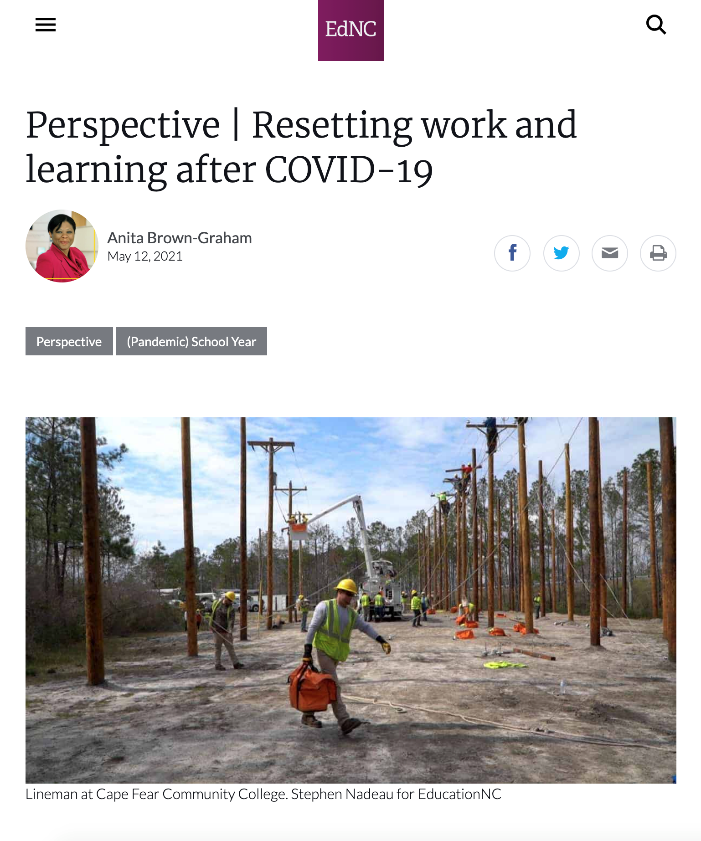
Perspective | Resetting work and learning after COVID-19
05/12/21“The predictions are of great concern for all students, but we know that some will be more disproportionately impacted by learning loss. Underserved students have been even more underserved during the pandemic. We need an acceleration plan.”
…
Continued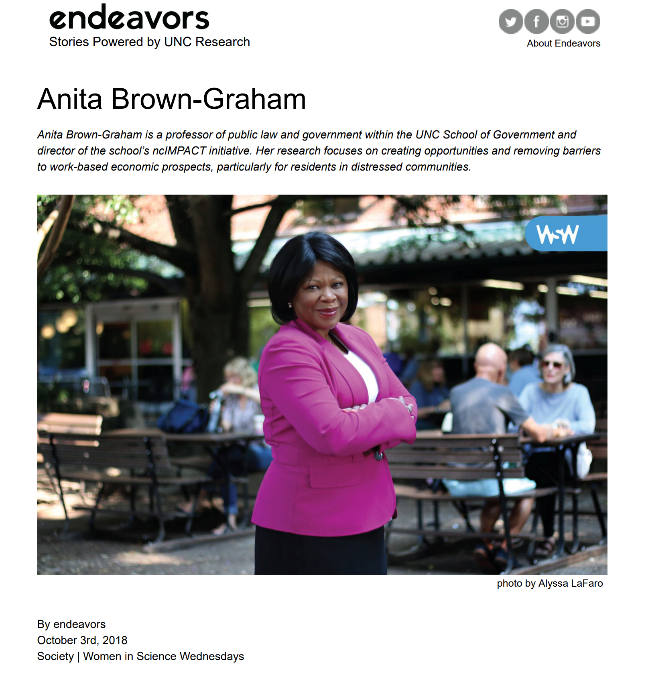
Spotlight on Anita Brown-Graham
10/03/18“There was no choice but to pivot and, on the spot, devise a constructive way to explore why people thought things were not better when the economy had been more robust and, more importantly, why they saw no prospects for progress. We went on to have a productive strategic visioning session and the community has made great strides in creating new economic engines.”
…
Continued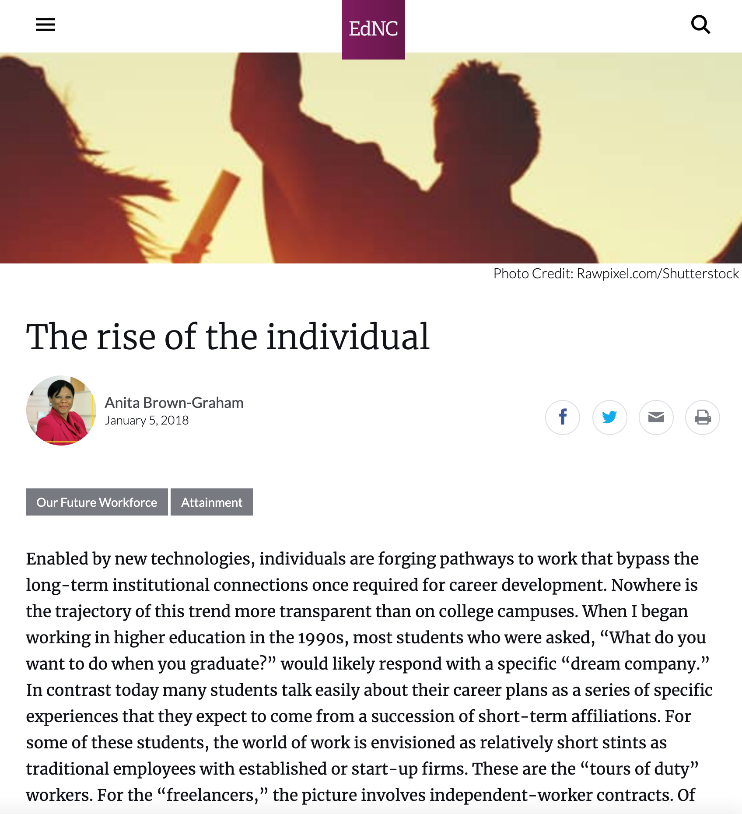
The Rise of the Individual
01/05/18“A new social contract is developing between companies and their workers, driving major changes in the employer-employee relationship. Workers want an enriching experience at every stage, rapid career growth, a compelling and flexible workplace, and a sense of mission and purpose at work. When employers fail to deliver on these employee expectations, and maybe even if they do, they can expect to see their employees leave after a few years.”
…
Continued
The Rise of New Business Models
01/04/18“Disruption in business is not new. We can all think of companies from our past that ceased to exist some time ago. Remember Kodak? What is different today is the pace of change. Established companies are here today and gone tomorrow. New companies appear today, and dominate the market tomorrow.
As every technology with a computing base advances on an exponential curve, we will continue to see significant disruption in almost every industry over the next decade.”
…
Continued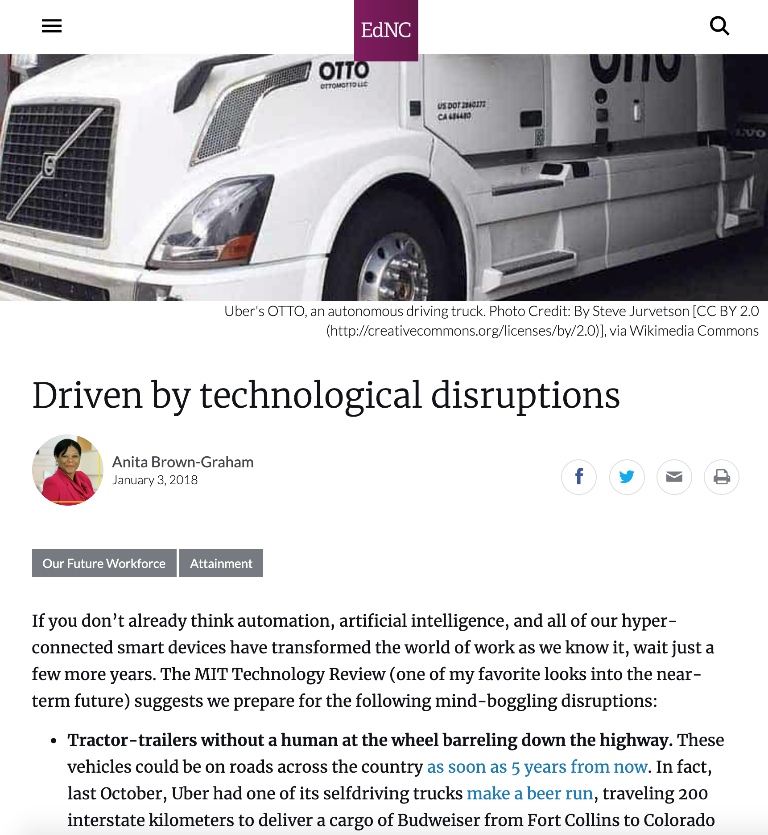
Driven by Technological Disruptions
01/03/18“A report by the World Economic Forum reveals that almost 65 percent of the jobs elementary school students will be doing in the future do not yet exist. Are we able to predict those jobs of the future? Frankly, while we may be able to project how a particular technology might render redundant certain human tasks in order to speculate about technological unemployment, it is more complicated to foresee the multiple ways a future technology may complement or create demand for existing human skills and jobs.”
…
Continued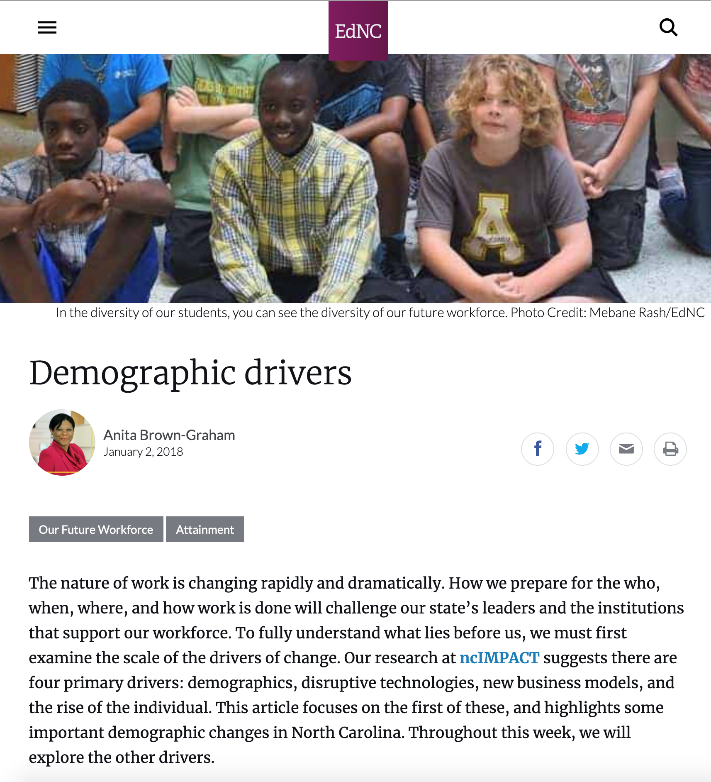
Demographic Drivers
01/02/18“North Carolina is growing. But according to demographic analysis by our friends at Carolina Demography, much of this growth follows a trend of clustering in the state’s existing population centers, and will continue to do so over the next two decades. As people increasingly reside in those areas, strong job growth tends to concentrate there, too.”
…
Continued
Tar Heel: Anita Brown-Graham Facilitates a Meeting of the Minds to Make NC a Better Place
07/02/16“Brown-Graham has the unique ability to bring diverse communities together to focus on and develop solutions for critical issues facing North Carolina,” says Randy Woodson, chancellor at N.C. State University, where the institute is based. Under her leadership, he says, the institute has “developed into an organization that continually improves the lives of citizens all across North Carolina.”
…
Continued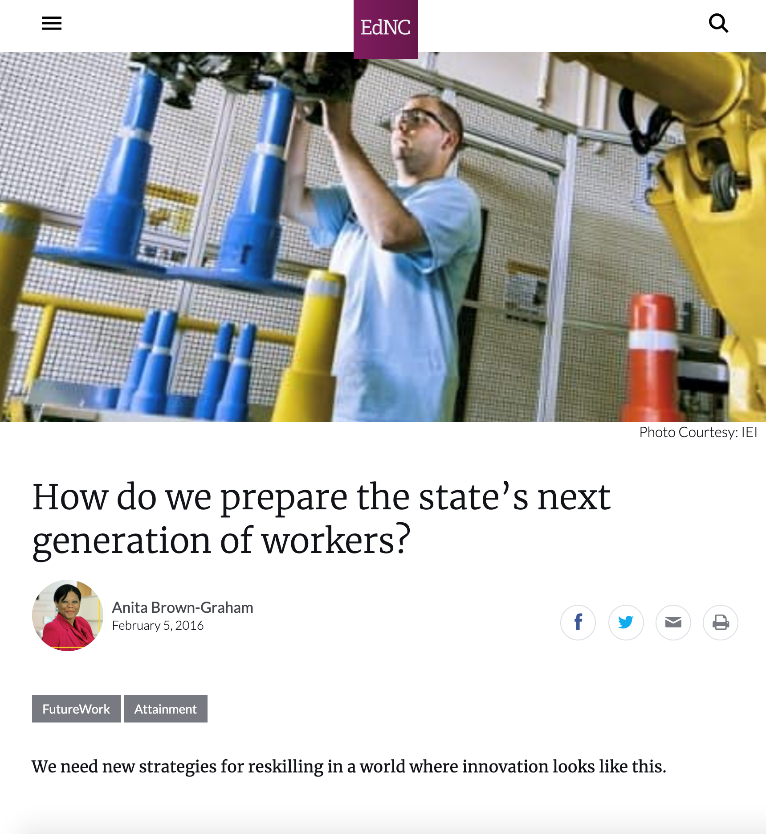
How Do We Prepare the State’s Next Generation of Workers?
02/06/16“Our challenge as a state is to identify opportunities that North Carolina must leverage today to successfully navigate the transformational employment market changes ahead. The Institute for Emerging Issues put that challenge before two groups, a Working Group of workforce and economic development organizations, industry, education systems, policy makers, current and future employees, and other key stakeholders, and Forum Ambassadors, career counseling professionals working in high schools, community colleges, universities, NCWorks Career Centers, local government workforce agencies, and community-based organizations.”
…
Continued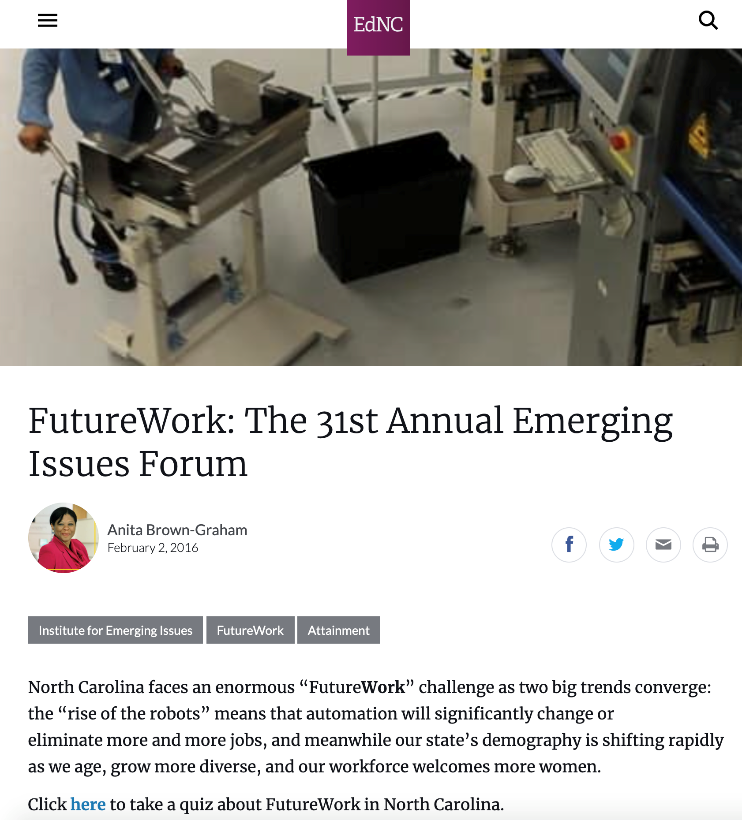
FutureWork: The 31st Annual Emerging Issues Forum
02/02/16“North Carolina faces an enormous “FutureWork” challenge as two big trends converge: the “rise of the robots” means that automation will significantly change or eliminate more and more jobs, and meanwhile our state’s demography is shifting rapidly as we age, grow more diverse, and our workforce welcomes more women.”
…
Continued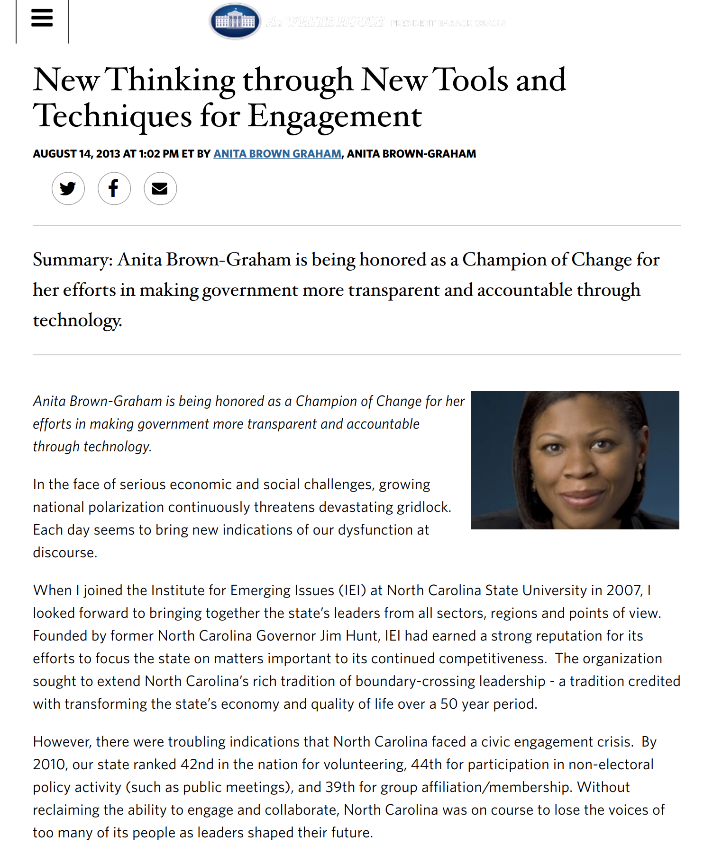
New Thinking through New Tools and Techniques for Engagement
08/14/13“IEI needed to respond to this crisis, but we could not act alone. We reached out for the wisdom of hundreds across the state. With their contributions of content, design support, software innovations and funding, we created the Emerging Issues Commons – a first of its kind engagement tool – both a physical space and an online hub that is today transforming how citizens across the state connect with each other, access information, and take collaborative action on important issues.”
…
Continued
Measures and Methods: Four Tenets for Rural Economic Development in the New Economy
10/01/08“There is no single recipe for prosperity. This is true for all rural areas, whether new economy winners or not. However, for any rural area to compete in the global economy, its development methods must explicitly address each of four pillars: innovation, investments, connections, and preservation.”
…
Continued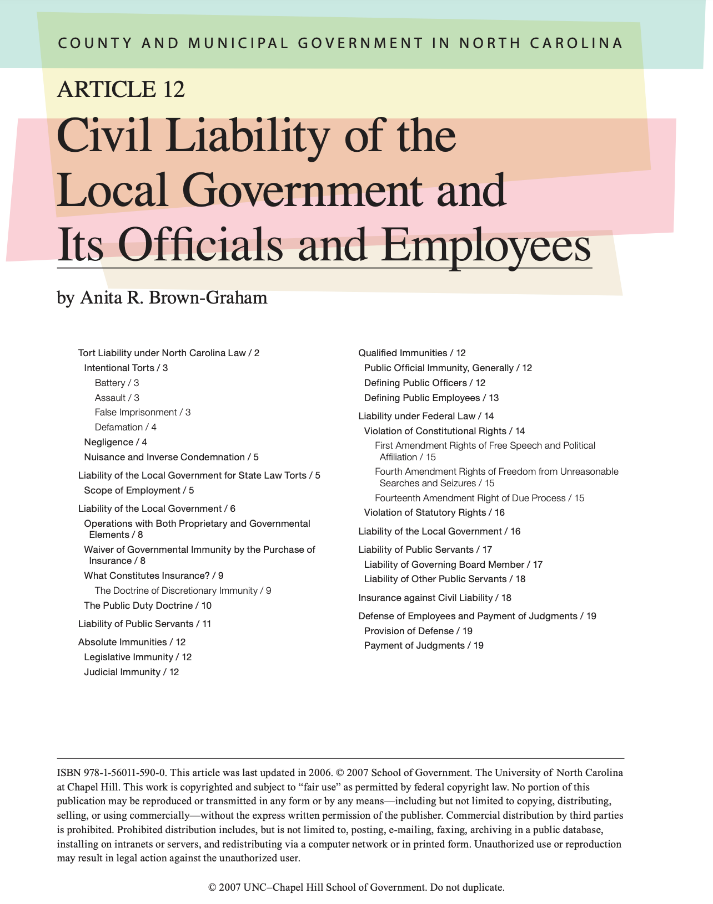
Civil Liability of the Local Government and Its Officials and Employees
07/24/07“This article deals with two basic areas of liability: tort liability under North Carolina law and liability under federal law for violations of the Civil Rights Act of 1871. … These two kinds of claims are the most common ones brought against public servants and their employers. As covered in this article, the state and federal rules governing these claims determine whether a local government and its public servants may be required to pay damages to someone harmed by official action.”
…
Continued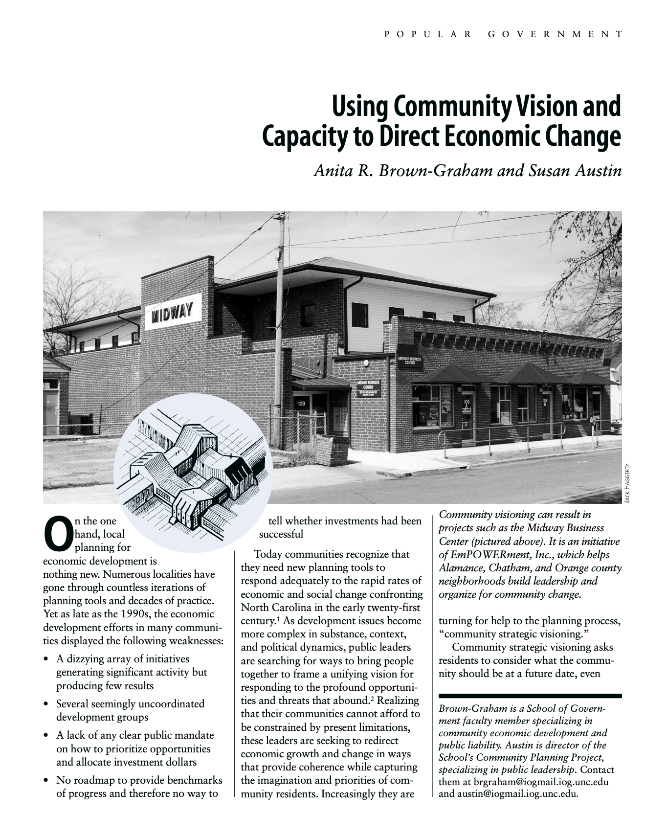
Using Community Vision and Capacity to Direct Economic Change
05/16/04“As development issues become more complex in substance, context, and political dynamics, public leaders are searching for ways to bring people together to frame a unifying vision for responding to the profound opportunities and threats that abound. Realizing that their communities cannot afford to be constrained by present limitations, these leaders are seeking to redirect economic growth and change in ways that provide coherence while capturing the imagination and priorities of community residents.”
…
Continued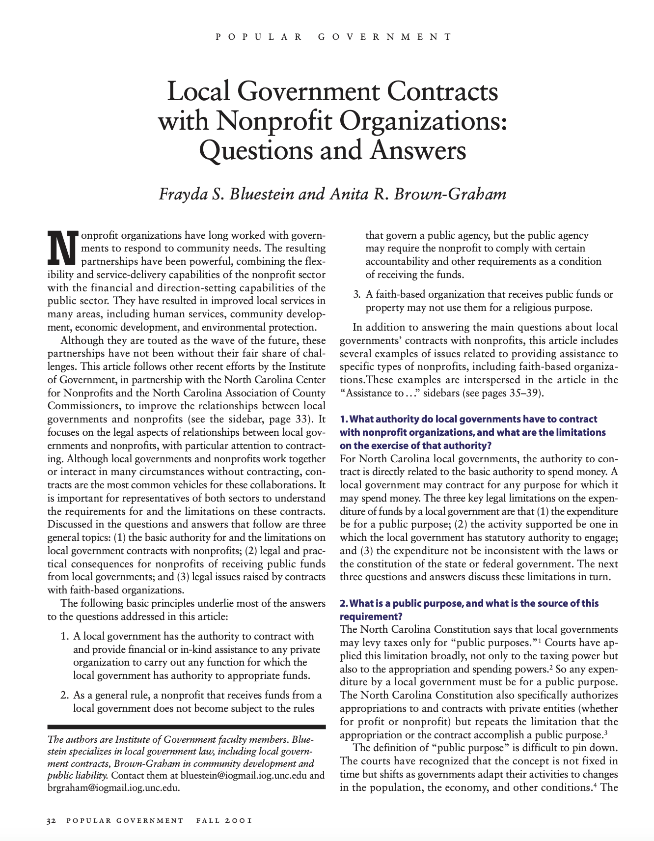
Local Government Contracts with Nonprofit Organizations: Questions and Answers
10/01/01“In addition to answering the main questions about local governments’ contracts with nonprofits, this article includes several examples of issues related to providing assistance to specific types of nonprofits, including faith-based organizations. These examples are interspersed in the article in the “Assistance to …” sidebars (see pages 35–39).”
…
Continued
When You Can’t Sue the State
07/24/00“Controversy over the meaning of federalism is not new. In the 1700s the nation’s founders heatedly debated the need to define and protect the position of states relative to the federal government. Throughout the 1800s Southern states repeatedly invoked states’ rights in an effort to preserve first slavery and then segregation. In the 1990s and into the year 2000, the Court has again revived debate about the fundamental nature of American federalism. Yet despite a perhaps valiant effort to develop a principled and workable doctrine, the Court has generated more questions than answers by its recent decisions.”
…
Continued
Housing Discrimination against Hispanics in Private Rental Markets
10/01/99“Race is the most frequently cited basis for housing discrimination complaints in North Carolina. African Americans make up the majority of complainants, and most of the complaints involve rental properties where property managers and landlords purposefully give misinformation about housing availability and cost to avoid renting to such people. But industry watchdogs estimate that the state’s emerging Hispanic population is the fastest-growing target of discrimination.”
…
Continued